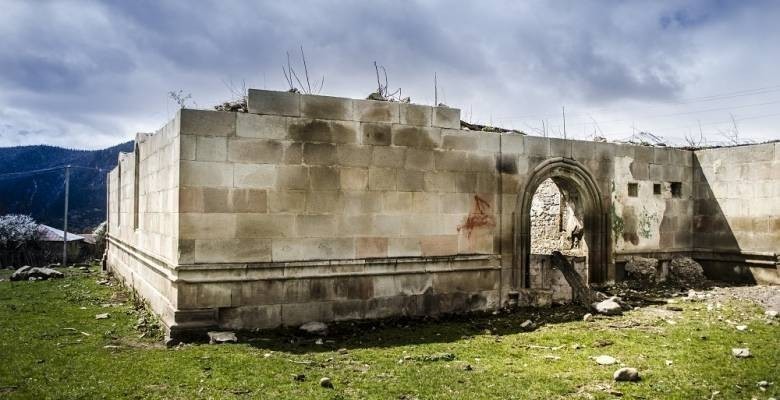საერთო ცხელი ხაზი +995 577 07 05 63


The Social Justice Center, in partnership with the European Human Rights Advocacy Center (EHRAC), submitted a report to the Council of Europe's Committee of Ministers on the enforcement of the case "Mikeladze et al. vs. Georgia" on the subject of improper treatment of local Muslims in the village of Mokhi. The report was drafted with the assistance of the USAID Rule of Law Program.
We would like to remind you that on November 17, 2021, the European Court of Justice found a breach of the rights of local Muslims who opposed the conversion of the historic mosque into a library in the village of Mokhi in 2014. According to the court's directives, the first petitioner seized during the protest was subjected to unjustified police treatment. In addition, the State failed to adequately investigate the applicants' accusations of police maltreatment and uncover a plausible religious prejudice motive. In the litigation, the Social Justice Centre and EHRAC represented the petitioners.
The report submitted by the Social Justice Center to the Committee of Ministers regarding the execution of the European Court of Justice's decision on the case states that the investigation into the allegations of improper treatment of the citizen is still ineffective and that the possible motive of religious intolerance on the part of the police officers has not been highlighted.
According to the report, Georgia's efforts to eradicate the systemic problem of ineffective investigation of crimes motivated by religious prejudice remain insufficient. Notably, it continues to be challenging to identify religious hate as a motive in the investigation process, involve victims in the investigative process, and achieve a low criminal prosecution rate. According to the report, establishing a specific unit with investigative authority inside the Ministry of Internal Affairs and refining a consistent statistical methodology for such crimes would increase the efficacy of hate crime investigations. In addition, it is essential to establish preventative strategies for combating hate crimes and train the investigating agencies' personnel accordingly.
In addition, the report criticizes the lack of a clear state policy and strategy for dealing with hate crimes and religious intolerance. The problem of discrimination based on religion, which is firmly ingrained at both the public and institutional levels, can only be resolved by implementing sophisticated and coordinated social, educational, and legal measures. Despite this, the government has not yet produced a human rights strategy and action plan beyond 2020 that would include specific measures for protecting religious rights. In addition, the activities and mission of the Agency for Religious Affairs under the Prime Minister of Georgia, which is the primary instrument of the Georgian government's action in the field of religious freedom, are inadequate and require significant adjustment. From this perspective, the State's inactivity implies a failure to recognize the need for structural reforms and points to a lack of political will.
In the report submitted to the Ministerial Committee, there is also an emphasis on the growth in religious disputes over the past decade, which seek to restrict the freedom of religious expression of the Muslim population[1]. An effective approach to such conflicts requires an analysis of the social and cultural context in Georgia's ethnically and religiously varied regions and a thorough inquiry into the underlying causes of conflict amongst communities. Instead, the State prioritizes avoiding conflicts and maintaining the status quo, even if it means violating the rights of the Muslim community, which heightens the risk of hatred and mistrust between the populations and the recurrence of conflicts. The recurrence of religiously driven hostilities against the Muslim minority demonstrates the urgent need for a fundamental shift in government policies and practices to prevent and resolve disputes.
The Committee of Ministers of the Council of Europe will assess the State of execution of the case "Mikeladze and Others v. Georgia" on December 6-8, 2022. The Social Justice Center hopes that the committee will consider the concerns raised in the report against the State and the recommendations for effective enforcement.
We would like to remind you that the European Court of Justice ministers have made a judgment regarding the Committee of the Council of Europe's oversight of enforcement procedures. In June 2022, the Committee of Ministers resolved to join the "Mikeladze and Others v. Georgia" lawsuit with the Identity group's cases[2]. The instances of the Identity group demonstrate the prevalence of hate crimes in the country and the inadequacy of the investigation system; as a result, the ministerial committee is examining them more closely. As part of the enhanced monitoring, the Government of Georgia has committed to providing an annual report to the Committee of Ministers on the specific and broad actions taken in the scope of each case. Appealing organizations are permitted to submit the Committee of Ministers' suggestions. Based on the reports of the government and appealing organizations, the Ministerial Committee examines the State's actions and decides on the quality of enforcement. The Social Justice Center's report was submitted within the framework of this mechanism. However, the government has not yet provided an updated report on the enforcement of the Identity Group cases or an action plan for the Mikeladze case.
The website accessibility instruction